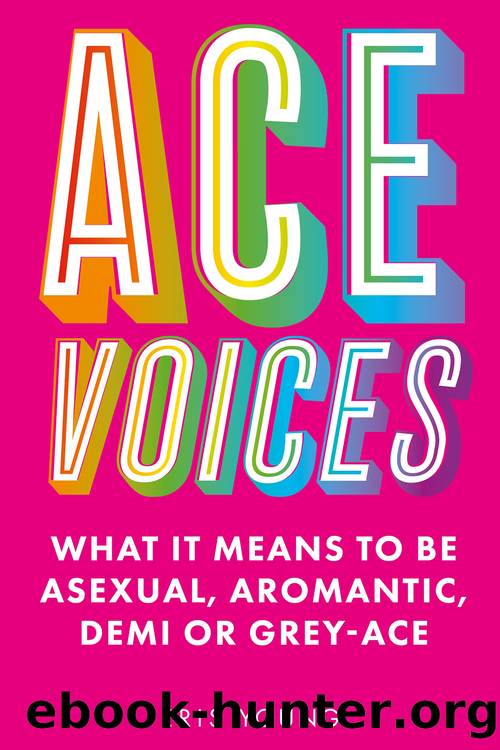Ace Voices by Eris Young

Author:Eris Young
Language: eng
Format: epub
Publisher: Jessica Kingsley Publishers
Published: 2021-12-21T00:00:00+00:00
What Is Love?
The languages of the world are rife with âuntranslateableâ words or phrases, used to describe different types of love or nuances of human connection. The concept of gezelligheid is very important in Dutch culture, describing a feeling of comfortable togetherness with loved ones that is hard to sum up.1 In Japanese, çã, or amae, specifically refers to a type of desire to be taken care of, that can describe the relationship between a person and their boss, spouse, parent or teacher.2 The Turkish word ciÄerpare, or âliver-partâ, refers to someone â equally relevant to a lover or a friend â who is so close to you as to be like a part of your own body,3 something like the English phrase âride or dieâ.
A number of these words and phrases relate specifically to romantic love and allow for a bit more nuance than is readily available in English. Japanese has a term, æã®äºæ, koi no yokan, that resembles the English phrase âlove at first sightâ, but goes farther than English, acknowledging the quixotic nature of falling for someone you hardly know â that first impressions are not always the best foundation for a lasting relationship.4 French and Romanian both have idiomatic expressions acknowledging that love is not always mutual or requited, that it does not always transcend all, and that this lack or failure of connection is as much a part of human relationships as the âhappily ever afterâ that we see in films.5
Some of these words â such as Urdu naz, Ùاز, the pride and confidence of being the object of another personâs love or desire6 â express reflexivity, how attractive attraction itself can be, in a way that reminds me of the a-spec term reciprosexual. Others such as Russian однолÑб, odnoliub,7 a person who only has one great love in their life, or who is only capable of loving one person at a time, seem to describe something that likewise isnât admitted by conventional ways we talk about relationships in English.
The ancient Greeks famously acknowledged the existence of a number of different types of love,8 categories whose definitions and connotations changed over time. More than one of these types of love and affection could exist simultaneously in the same person. Words like pragma, a kind of long-term commitment and care that comes from knowing another person intimately, or philia, the love between close friends, acknowledge that sexual-romantic bonds are not the only way for two people to love each other.
Framing these different types of affection and passion as all equally important, too, suggests an understanding that no single person in your life can fulfil all of your needs. And while itâs hard to know how actual people in ancient Greece used these words, their existence nonetheless evokes a time and place where deep, lasting and intimate bonds that were neither sexual nor romantic could still have been celebrated and respected.
By bringing up these words, Iâm not necessarily saying that speakers of the languages I mentioned above
Download
This site does not store any files on its server. We only index and link to content provided by other sites. Please contact the content providers to delete copyright contents if any and email us, we'll remove relevant links or contents immediately.
Cecilia; Or, Memoirs of an Heiress — Volume 1 by Fanny Burney(32527)
Cecilia; Or, Memoirs of an Heiress — Volume 2 by Fanny Burney(31928)
Cecilia; Or, Memoirs of an Heiress — Volume 3 by Fanny Burney(31916)
The Great Music City by Andrea Baker(31899)
We're Going to Need More Wine by Gabrielle Union(19020)
All the Missing Girls by Megan Miranda(15890)
Pimp by Iceberg Slim(14464)
Bombshells: Glamour Girls of a Lifetime by Sullivan Steve(14038)
For the Love of Europe by Rick Steves(13818)
Talking to Strangers by Malcolm Gladwell(13331)
Norse Mythology by Gaiman Neil(13317)
Fifty Shades Freed by E L James(13216)
Mindhunter: Inside the FBI's Elite Serial Crime Unit by John E. Douglas & Mark Olshaker(9297)
Crazy Rich Asians by Kevin Kwan(9261)
The Lost Art of Listening by Michael P. Nichols(7476)
Enlightenment Now: The Case for Reason, Science, Humanism, and Progress by Steven Pinker(7288)
The Four Agreements by Don Miguel Ruiz(6728)
Bad Blood by John Carreyrou(6600)
Weapons of Math Destruction by Cathy O'Neil(6248)
